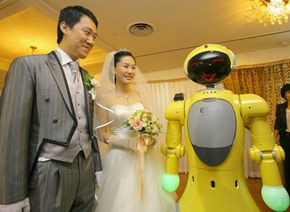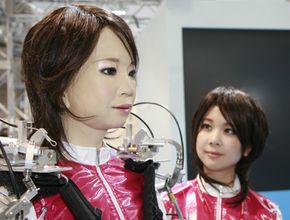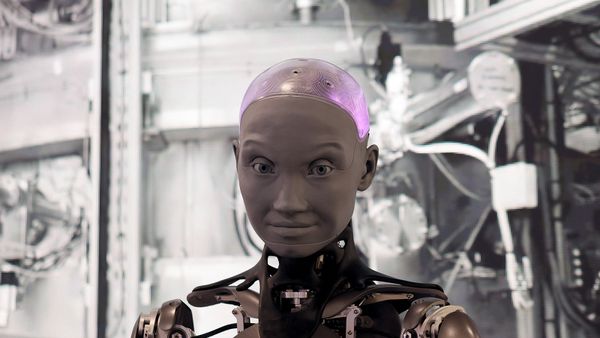You've known each another for many years now, and you've come to truly understand each another. You share a home, pay bills and putter around the garden together. The two of you look forward to your Sunday morning ritual of working on The New York Times crossword puzzle together. You are truly and deeply in love.
You'd like to get married, but unfortunately, you live in a society where your relationship is considered unnatural and immoral. Despite the breadth of your love for each other, marriage is against the law. If your beloved were a human and not a robot, society might be more tolerant.
Advertisement
While the idea of human-robot marriage may seem far-fetched now, it may one day come to pass if artificial intelligence researcher David Levy's theory is correct.
Levy, a British researcher who recently earned a Ph.D. from the University of Maastricht in the Netherlands, believes that by 2050, robots and humans will be able to marry legally in the United States. He predicts that Massachusetts will lead the way as it did in 2004, when it became the first state to allow same-sex marriages between humans.
As robots become increasingly humanoid in appearance, Levy and other roboticists believe that people will begin to have sex with robots -- as soon as 2011, says at least one artificial intelligence theorist [source: Economist]. Physical attractiveness, coupled with the advances in robot programming that will allow human-like emotions and intellect in robots, could produce artificial mates that some humans will want to marry.
In fact, Levy told one reporter, it's "inevitable" [source: LiveScience].
Why is he so confident? For his doctoral thesis, Levy researched sociology, sexology, robotics, artificial intelligence and other fields related to marriage, love and robots. He concluded that all of the most important factors that cause humans to fall in love with one another could be programmed into robots. Do you like your women to be coquettish? Your robot will be programmed to be demure and to flirt. Does a strong, sensitive man who likes to build premium furniture light your fire? In the not-too-distant future, say some researchers, your perfect man will be available for purchase.
We’ve already had a peek at everyday life within a human-robot marriage. Remember the Geek Squad “Mandroid” commercial featuring the robot husband with the whistling lisp?
Levy isn't predicting that human couples will stop falling in love and reproducing. He doesn't even think a lot of people will opt for a robotic mate. Instead, Levy thinks that robots will offer a few people a viable alternative to being unable to find their ideal partner. Shy people who are uncomfortable meeting others could potentially benefit from marriage to a robot. So, too, could the mentally ill and people who "have unpleasant personalities" [source: LiveScience].
But does this mean that robots will be created just so jerks can have someone to push around? What happens when pushing people around leads to the "death" of the robot? It turns out that there are many people thinking today about the ethical implications robotic life will pose tomorrow. Read the next page to find out what they've concluded.
Advertisement



